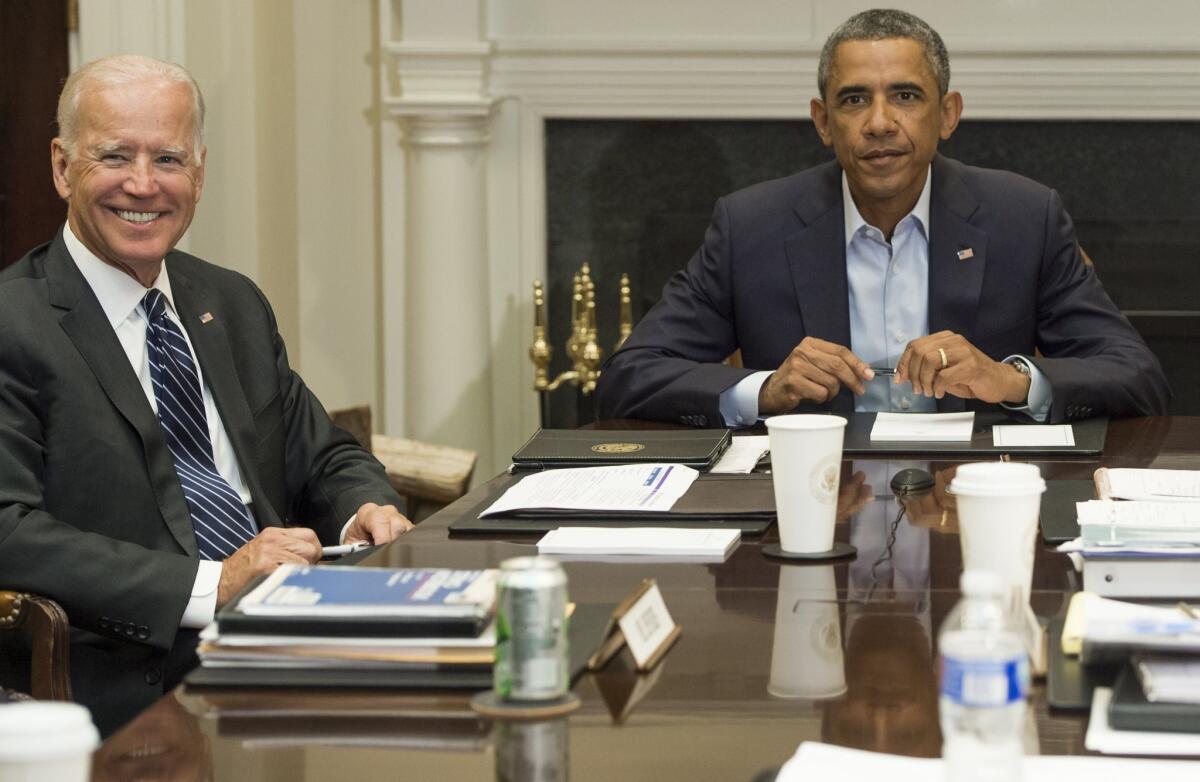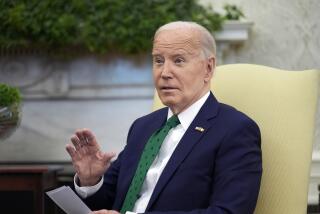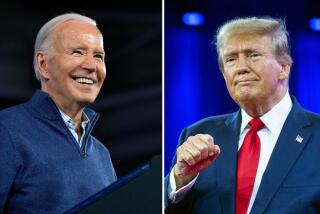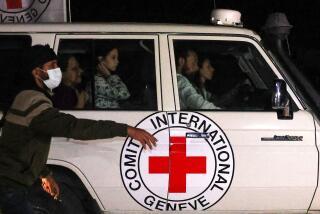Obama and Biden: Cool and heated responses to a second American death

The cool and hot of Barack Obama and Joe Biden were very much in evidence Wednesday as they responded to the beheading of a pair of American journalists by Islamic terrorists: A common strategy expressed in two wildly different tones.
The administration has yet to say how it will confront the militant Islamic State beyond airstrikes; any strategy is shot through with complications involving friends and enemies in the Middle East and, not least, the terrorists’ ability to disappear into a civilian population that the U.S. would prefer not to antagonize as part of the pursuit.
Nevertheless, the administration’s odd couple did present something of a united face. Obama, at a news conference in Tallinn, Estonia, en route to a NATO summit, called the beheadings “barbarism.” Biden, in an appearance in New Hampshire, called the perpetrators “barbarians.” Obama said the acts would “stiffen our resolve.” Biden said that America was “so much more resolved than any enemy can fully understand.” Both men — Biden overtly, Obama elliptically — conjured the strafed body of Osama bin Laden as proof that time would not still the desire for payback.
Beyond that, the distinctions between the two were glaring. At his news conference with the president of Estonia, Obama maintained the presence familiar for more than five years of his presidency as he rode the edge between cerebral and calm to the point of seeming detachment. He appeared intent on describing the American viewpoint professorially, with an occasional sense of light frustration at having to go over it all once again.
As president his words are always weighted with the ghosts of the past, particularly the need to not replicate the actions of George W. Bush and the disastrous invasion of Iraq. And while Obama spoke with obvious upset two weeks ago when the first American, James Foley, was killed, his remarks Wednesday seemed much more intended to dispel any doubts that his administration was lagging when it came to figuring out how to hit back.
“It is very important from my perspective that when we send our pilots in to do a job, that we know that this is a mission that’s going to work, that we’re very clear on what our objectives are, what our targets are; we’ve made the case to Congress and we’ve made the case to the American people; and we’ve got allies behind us so that it’s not just a one-off, but it’s something that over time is going to be effective,” Obama said.
He seemed less interested in sating the cable TV talkers’ lust for revenge than offering a realistic, though perhaps less immediately gratifying, view of what would constitute success.
“As we’ve seen with Al Qaeda, there are always going to be remnants that can cause havoc of any of these networks, in part because of the nature of terrorist activities,” Obama said. “You get a few individuals, and they may be able to carry out a terrorist act. But what we can do is to make sure that the kind of systemic and broad-based aggression that we’ve seen … is degraded to the point where it is no longer the kind of factor that we’ve seen it being over the last several months.
“We can continue to shrink ISIL’s sphere of influence, its effectiveness, its financing, its military capabilities to the point where it is a manageable problem.”
Biden, as vice president, carries less of Obama’s burden, and he was left to vent the emotions he shares with many upset Americans. If in some quarters Obama has become, midway through his second term, the houseguest who stayed too long, Biden remains the heart-on-his-sleeve Irish uncle who sails through the front door and riles up the kids just before bedtime.
“They somehow think that it’s going to lessen U.S. resolve, frighten us, intimidate us,” he angrily declared of the killing of the second American, Steven Joel Sotloff. “But if they think the American people will be intimidated, they don’t know us very well. We came back after 9/11. We dusted ourselves off and we made sure Osama bin Laden would never ever again threaten the American people. We came back, Boston strong, blaming no one but resolved to be certain that this didn’t happen again…
“When people harm Americans we don’t retreat, we don’t forget, we take care of those who are grieving and when that’s finished they should know we will follow them to the gates of hell until they are brought to justice because hell is where they will reside!
“Hell is where they will reside!” he repeated.
It was a fresh look at what a Biden presidential candidacy would sound like, were he to take on that other Democrat whose words are often carefully calibrated, former Secretary of State Hillary Rodham Clinton.
And it was a reminder of the attraction Obama felt when first he asked Biden to join the Democratic ticket in 2008. It was not just Biden’s broad foreign policy expertise, which Obama notably lacked, but his passion and willingness to say things that Obama either could, or would, not.
For political news and analysis, follow me on Twitter: @cathleendecker
More to Read
Start your day right
Sign up for Essential California for news, features and recommendations from the L.A. Times and beyond in your inbox six days a week.
You may occasionally receive promotional content from the Los Angeles Times.






